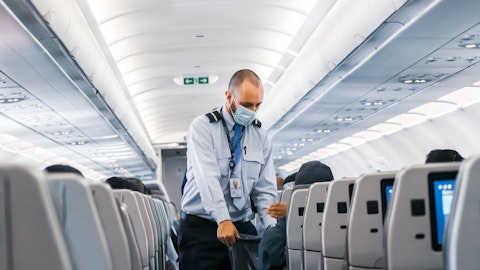Operator: Our next question comes from Michael Linenberg from Deutsche Bank. Please go ahead.
Michael Linenberg: Congratulations, Mike, on your promotion, and Kristina on your recognition. Scott, I’m going to go to the other end, kind of the side of your business that caters to, call it, the higher-end consumer. And I guess when I think about just the recent top-up order on the 787s, adding to your current order, I mean, it’s significant. I think it’s actually one of the largest widebody orders out there, at least for a U.S. carrier. Is the internal thinking at United just given the shape of the OEMs, whether it’s the manufacturers or the engine makers that we could be facing maybe some kind of widebody shortage in the back half of this decade? What are your thoughts on that?
Andrew Nocella: Mike, I’ll give it a try. I do think the production lines for widebody jets don’t produce nearly as many aircraft as the narrow-bodies, as you know. So, there are definitely not as many that are going to be produced. But more to the point, the widebodies we just ordered are for 2028 and beyond. And it’s really our confidence in our plan, but it’s particularly our confidence that we are going to increasingly pivot in the latter part of the decade to global growth and not domestic growth. And so, we secured those positions. We’re confident we’ll use them. We have a significant fleet of 777s and 767s that need to retire at some point later this decade, at least for the 767 for sure. And so with the number of retirements we have, the confidence in our plan and some of the OEM issues that you just brought up, this just made sense.
Again, it’s for 2028 and beyond. It’s a long time away. But we are really confident in the plan. We’re confident that global growth, we will have to lean into that, and we will want to lean into that in the latter part of the decade.
Mike Leskinen: Hey Mike, this is Mike. I’ll pile on. With the delays in the supply chain, they’ve become persistent. And so, part of what we’re doing is controlling Skyline for a longer period of time than we have historically. This industry has been an industry that has in the past gone from putting out fire to fire. And United Next strategy is putting us on a firmer footing to plan for the longer term. So a, I want to highlight that the contractual delivery dates, they’ve been pushing to the right. And we’ll probably continue to see that. And you see us — as you see us playing internally, we’ll have some expectation of continued slipping. But make no mistake, we will make adjustments to the order book and the delivery times in a way that maximize the returns to our shareholders. And we will focus on return on invested capital in addition to our pretax margin as we take delivery of those aircraft.
Michael Linenberg: Okay, great. And just one quick follow-up. Just any early thoughts on maybe this proposed regulation around credit cards and maybe a cap on merchant fees. I know, it’s proposed legislation, so it obviously has to go through a process, but any sort of early take on it or maybe it’s a TBD?
Scott Kirby: I’m happy to answer that. Look, it would be really, really bad policy for consumers in this country. It’s a bill that would — 84% of U.S. consumers have some kind of rewards card in their wallet, I bet almost everyone on this call has one. And they like them, and they like them a lot. Our customers certainly like them a lot. And so I think it’d be hard in Congress to take a vote that 84% of your voters are going to be upset with the outcome of that vote. And by the way, this will kill rewards program, it would not exist anymore, will kill debit card rewards programs when it happens. And I think it’s a bad policy. And I also think it kind of misses the mark because in the credit card is just a couple of things.
And this is the mark with small businesses. I understand the frustration with small businesses. But small businesses are actually — there’s middleman in between credit card companies, the banks and the small businesses. And I think that’s probably where the bulk of the issues are. Some of those middlemen charge square charges as little as 35 basis points, and some of those middlemen are charging businesses 300 or 400 basis points. And so, I think, it probably misses the mark. And then the final point would be, it’s remarkable how good the cybersecurity is at the credit card process. They’ve invested heavily in it. It’s not easy to replicate. And think about how many billions of transactions are happening every day and how rare breaches or problems are.
And so, I think, this is one of those that I’ve spent now a fair amount of time in D.C. talking to people. They didn’t know much about it before because as it’s come up. But as you talk to people about it, they more and more say, well, those are a bunch of good points. We need to go through regular order, we need to examine this. And so I think as long as we do that, as long as we examine it through regular order, which is the right way to pass consequential legislation, the facts will win today and nothing is going to happen.
Operator: Our next question comes from Conor Cunningham with Melius Research.
Conor Cunningham: Just on cost. I’m trying to understand the trends between your core cost performance and just how these supply chain transitory issues that you’ve laid out are kind of impacting. I realize that it’s probably really hard to tell right now, but you could just frame up when you think some of these potential transitory cost pressures may ease next year? That would be helpful. Thank you.
Mike Leskinen: Conor, this is Mike. Let me take a shot at that. And I will acknowledge the 4Q CASM headwind we faced versus our expectations earlier in the year. Let me try to size that. We expect to fly in the fourth quarter about 3 points lower than we thought just three months ago. Now 2 points of that is due to captain upgrade issue that Scott talked about on our last earnings call. The Captain Upgrade issue has impacted the entire industry. We have navigated that really well at United but it did hit us here at the end of the year. Our new contract with ALPA does fix that. And so the — on the horizon, we have a full expectation that that constraint goes away. But for the fourth quarter, that caused 2 of the 3 points. The other point was due to the violence in Tel Aviv and the loss of that flying.





